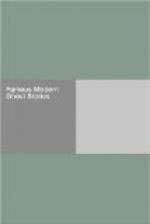When he was fifty years old Adrian Borlsover lost his sight. In a wonderfully short time he had adapted himself to the new conditions of life. He quickly learned to read Braille. So marvelous indeed was his sense of touch that he was still able to maintain his interest in botany. The mere passing of his long supple fingers over a flower was sufficient means for its identification, though occasionally he would use his lips. I have found several letters of his among my father’s correspondence. In no case was there anything to show that he was afflicted with blindness and this in spite of the fact that he exercised undue economy in the spacing of lines. Towards the close of his life the old man was credited with powers of touch that seemed almost uncanny: it has been said that he could tell at once the color of a ribbon placed between his fingers. My father would neither confirm nor deny the story.
I
Adrian Borlsover was a bachelor. His elder brother George had married late in life, leaving one son, Eustace, who lived in the gloomy Georgian mansion at Borlsover Conyers, where he could work undisturbed in collecting material for his great book on heredity.
Like his uncle, he was a remarkable man. The Borlsovers had always been born naturalists, but Eustace possessed in a special degree the power of systematizing his knowledge. He had received his university education in Germany, and then, after post-graduate work in Vienna and Naples, had traveled for four years in South America and the East, getting together a huge store of material for a new study into the processes of variation.
He lived alone at Borlsover Conyers with Saunders his secretary, a man who bore a somewhat dubious reputation in the district, but whose powers as a mathematician, combined with his business abilities, were invaluable to Eustace.
Uncle and nephew saw little of each other. The visits of Eustace were confined to a week in the summer or autumn: long weeks, that dragged almost as slowly as the bath-chair in which the old man was drawn along the sunny sea front. In their way the two men were fond of each other, though their intimacy would doubtless have been greater had they shared the same religious views. Adrian held to the old-fashioned evangelical dogmas of his early manhood; his nephew for many years had been thinking of embracing Buddhism. Both men possessed, too, the reticence the Borlsovers had always shown, and which their enemies sometimes called hypocrisy. With Adrian it was a reticence as to the things he had left undone; but with Eustace it seemed that the curtain which he was so careful to leave undrawn hid something more than a half-empty chamber.
* * * * *
Two years before his death Adrian Borlsover developed, unknown to himself, the not uncommon power of automatic writing. Eustace made the discovery by accident. Adrian was sitting reading in bed, the forefinger of his left hand tracing the Braille characters, when his nephew noticed that a pencil the old man held in his right hand was moving slowly along the opposite page. He left his seat in the window and sat down beside the bed. The right hand continued to move, and now he could see plainly that they were letters and words which it was forming.




